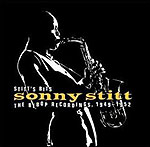
Unfairly forgotten
|
This review first appeared in Turbula in December 2006.
Sonny Stitt was one of the giants of jazz in the 1950s. If his influence and larger significance faded in the 1960s and '70s (before he passed in 1982), the tenor saxophonist's 1950s work remains some of the most remarkable of that very fertile decade.
A new three-disc set from Concord Records' Prestige imprint shows why Stitt was so highly regarded – held in the same esteem as Sonny Rollins and Cannonball Adderley, just a notch below the sheer genius of Charlie "Bird" Parker and John Coltrane as saxophonists. Taken from sessions Stitt recorded both as leader and as sideman to other artists (Gene Ammons, Teddy Wilson, Jay Jay Johnson), "Stitt's Bits: The Betop Recordings, 1949-1952" shows a young musician with a fully matured style: A clean, powerful tone combined to a lithe, athletic style.
Often, and unfairly, consigned to nothing more than discipleship to Parker, these recordings demonstrate that Stitt always had his own thing going. He was more upfront in his playing than Bird, for starters, less restrained. It's like the difference between Basie and Ellington as pianists. This is particularly true on the tracks where Stitt is the leader: His playing is almost muscular – strong, bold, completely and utterly American in its confident self-assuredness. Even on a soft ballad like "Ain't Misbehavin'," Stitt is so completely masculine in his playing that it sounds like Humphrey Bogart might have sounded had he ever picked up a horn.
Neither prolific nor noteworthy as a songwriter, Stitt was primarily an interpreter. But whether covering a popular hit like "Taking a Chance on Love" or "Until the Real Thing Comes Along" or a jazz standard or even a little-known original composition from his own pen, Stitt could wrap that gorgeous tone and superb playing around any song and make it absolutely his own.
Being a box set, there are multiple takes of some tracks, which might be a bit much for those who aren't already smitten by Stitt's playing. On the other hand, the liner notes are informative, the photography gorgeous.
